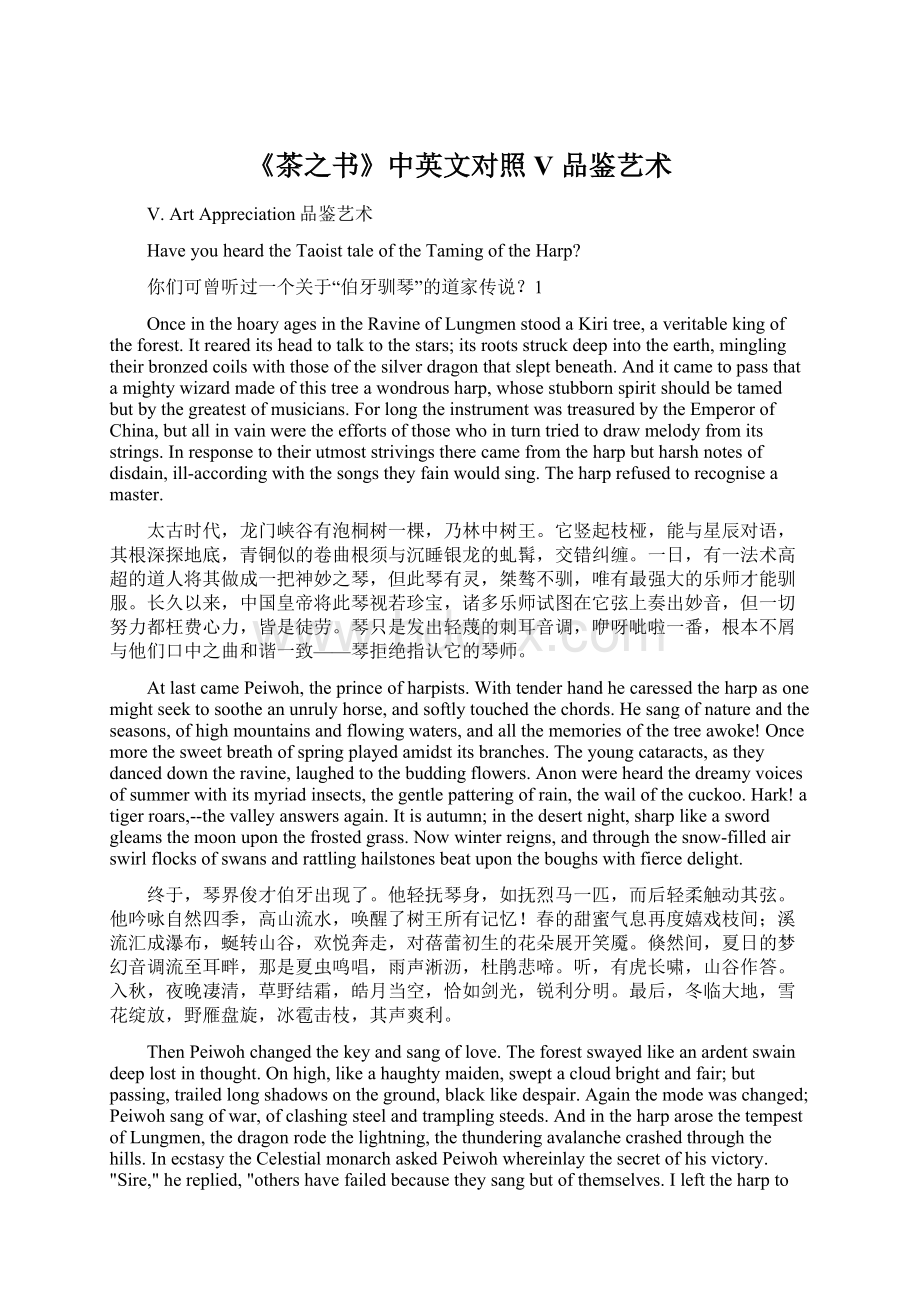《茶之书》中英文对照 V 品鉴艺术.docx
《《茶之书》中英文对照 V 品鉴艺术.docx》由会员分享,可在线阅读,更多相关《《茶之书》中英文对照 V 品鉴艺术.docx(7页珍藏版)》请在冰豆网上搜索。

《茶之书》中英文对照V品鉴艺术
V.ArtAppreciation品鉴艺术
HaveyouheardtheTaoisttaleoftheTamingoftheHarp?
你们可曾听过一个关于“伯牙驯琴”的道家传说?
1
OnceinthehoaryagesintheRavineofLungmenstoodaKiritree,averitablekingoftheforest.Itreareditsheadtotalktothestars;itsrootsstruckdeepintotheearth,minglingtheirbronzedcoilswiththoseofthesilverdragonthatsleptbeneath.Anditcametopassthatamightywizardmadeofthistreeawondrousharp,whosestubbornspiritshouldbetamedbutbythegreatestofmusicians.ForlongtheinstrumentwastreasuredbytheEmperorofChina,butallinvainweretheeffortsofthosewhointurntriedtodrawmelodyfromitsstrings.Inresponsetotheirutmoststrivingstherecamefromtheharpbutharshnotesofdisdain,ill-accordingwiththesongstheyfainwouldsing.Theharprefusedtorecogniseamaster.
太古时代,龙门峡谷有泡桐树一棵,乃林中树王。
它竖起枝桠,能与星辰对语,其根深探地底,青铜似的卷曲根须与沉睡银龙的虬髯,交错纠缠。
一日,有一法术高超的道人将其做成一把神妙之琴,但此琴有灵,桀骜不驯,唯有最强大的乐师才能驯服。
长久以来,中国皇帝将此琴视若珍宝,诸多乐师试图在它弦上奏出妙音,但一切努力都枉费心力,皆是徒劳。
琴只是发出轻蔑的刺耳音调,咿呀呲啦一番,根本不屑与他们口中之曲和谐一致——琴拒绝指认它的琴师。
AtlastcamePeiwoh,theprinceofharpists.Withtenderhandhecaressedtheharpasonemightseektosootheanunrulyhorse,andsoftlytouchedthechords.Hesangofnatureandtheseasons,ofhighmountainsandflowingwaters,andallthememoriesofthetreeawoke!
Oncemorethesweetbreathofspringplayedamidstitsbranches.Theyoungcataracts,astheydanceddowntheravine,laughedtothebuddingflowers.Anonwereheardthedreamyvoicesofsummerwithitsmyriadinsects,thegentlepatteringofrain,thewailofthecuckoo.Hark!
atigerroars,--thevalleyanswersagain.Itisautumn;inthedesertnight,sharplikeaswordgleamsthemoonuponthefrostedgrass.Nowwinterreigns,andthroughthesnow-filledairswirlflocksofswansandrattlinghailstonesbeatupontheboughswithfiercedelight.
终于,琴界俊才伯牙出现了。
他轻抚琴身,如抚烈马一匹,而后轻柔触动其弦。
他吟咏自然四季,高山流水,唤醒了树王所有记忆!
春的甜蜜气息再度嬉戏枝间;溪流汇成瀑布,蜒转山谷,欢悦奔走,对蓓蕾初生的花朵展开笑魇。
倏然间,夏日的梦幻音调流至耳畔,那是夏虫鸣唱,雨声淅沥,杜鹃悲啼。
听,有虎长啸,山谷作答。
入秋,夜晚凄清,草野结霜,皓月当空,恰如剑光,锐利分明。
最后,冬临大地,雪花绽放,野雁盘旋,冰雹击枝,其声爽利。
ThenPeiwohchangedthekeyandsangoflove.Theforestswayedlikeanardentswaindeeplostinthought.Onhigh,likeahaughtymaiden,sweptacloudbrightandfair;butpassing,trailedlongshadowsontheground,blacklikedespair.Againthemodewaschanged;Peiwohsangofwar,ofclashingsteelandtramplingsteeds.AndintheharparosethetempestofLungmen,thedragonrodethelightning,thethunderingavalanchecrashedthroughthehills.InecstasytheCelestialmonarchaskedPeiwohwhereinlaythesecretofhisvictory."Sire,"hereplied,"othershavefailedbecausetheysangbutofthemselves.Ilefttheharptochooseitstheme,andknewnottrulywhethertheharphadbeenPeiwohorPeiwohweretheharp."
然后调子一转,伯牙转而歌咏爱情。
森林摇摆,如热切的情郎迷失于他的思恋。
高空之上,云朵光明亮丽,如骄矜的少女拂略而过,而后消逝不见,唯见地上长长的阴影,绝望般漆黑。
调子再变,伯牙接着歌唱战争,歌唱刀光剑影,战马嘶鸣。
一场风暴从琴弦上流出,席卷了龙门;银龙腾云驾雾,穿梭于闪电之间,势不可挡的雷鸣,足以使山崩地裂。
听闻此曲,皇帝大喜,忙问伯牙驯琴的秘诀。
“殿下,”伯牙答道,“其他乐师急于奏出自我的歌曲,而我则由琴选取它自己的主题。
事实上,鼓琴之时,究竟是琴成了伯牙,还是伯牙成了琴,恐怕连伯牙自己也分辨不清了。
”
Thisstorywellillustratesthemysteryofartappreciation.Themasterpieceisasymphonyplayeduponourfinestfeelings.TrueartisPeiwoh,andwetheharpofLungmen.Atthemagictouchofthebeautifulthesecretchordsofourbeingareawakened,wevibrateandthrillinresponsetoitscall.Mindspeakstomind.Welistentotheunspoken,wegazeupontheunseen.Themastercallsforthnotesweknownotof.Memorieslongforgottenallcomebacktouswithanewsignificance.Hopesstifledbyfear,yearningsthatwedarenotrecognise,standforthinnewglory.Ourmindisthecanvasonwhichtheartistslaytheircolour;theirpigmentsareouremotions;theirchiaroscurothelightofjoy,theshadowofsadness.Themasterpieceisofourselves,asweareofthemasterpiece.
这个故事娓娓道出了艺术鉴赏的奥秘。
艺术作品是一曲交响,在我们最为细腻的心弦上奏响。
伯牙才是真正的艺术,而我们则是那架龙门古琴。
在美的神奇撩拨之下,我们内心秘密的琴弦被唤醒了,颤动着,战栗着,激情澎湃地回应美的召唤。
心相印,有灵犀。
倾听于无声,观赏于无形。
艺术大师唤起我们心里未曾知晓的音符,久违的记忆重新返回自身,带来新的意义。
那些被恐惧压抑的希冀,那些未曾正视的渴望,重新升起并闪耀光芒。
我们的心是艺术家们挥毫泼墨的画布,他们的颜料调制我们情绪的色彩,他们的明暗光影诉说着我们欢乐的辉光与悲伤的阴影。
此刻,作品即自我,自己即作品。
Thesympatheticcommunionofmindsnecessaryforartappreciationmustbebasedonmutualconcession.Thespectatormustcultivatetheproperattitudeforreceivingthemessage,astheartistmustknowhowtoimpartit.Thetea-master,Kobori-Enshiu,himselfadaimyo,haslefttousthesememorablewords:
"Approachagreatpaintingasthouwouldstapproachagreatprince."Inordertounderstandamasterpiece,youmustlayyourselflowbeforeitandawaitwithbatedbreathitsleastutterance.AneminentSungcriticoncemadeacharmingconfession.Saidhe:
"InmyyoungdaysIpraisedthemasterwhosepicturesIliked,butasmyjudgmentmaturedIpraisedmyselfforlikingwhatthemastershadchosentohavemelike."Itistobedeploredthatsofewofusreallytakepainstostudythemoodsofthemasters.Inourstubbornignorancewerefusetorenderthemthissimplecourtesy,andthusoftenmisstherichrepastofbeautyspreadbeforeourveryeyes.Amasterhasalwayssomethingtooffer,whilewegohungrysolelybecauseofourownlackofappreciation.
艺术欣赏中灵犀相通的交流,必须基于相互退让的谦逊精神。
观赏者必须培养起正确的心态,以接收作品所传递的讯息,而艺术家则必须知晓如何将作品的讯息传递出来。
身为大名的茶师小堀远州,留给我们如下隽永名言:
“面画如面君。
”意欲理解一件作品,必须以谦卑的姿态站在作品面前,屏息凝神,等待它从静默中流出的只言片语。
一位著名的宋代评论家曾做过一番极有趣的自白:
“年少时,对于我喜爱的画作,我称颂作品的创作者;而随着艺术判断的成熟,我开始称颂自己,因我知妙笔于何处生花。
”应当哀叹,我们之中鲜有人愿费心费力,去研读艺术家的心绪。
出于顽固的无知,我们拒绝向艺术家致以此种最为普通的尊重,于是便常错失眼前的美的盛宴。
艺术家们以美味佳肴款待我们,而我们却因缺乏鉴赏力而无福享用,只能饥肠辘辘。
Tothesympatheticamasterpiecebecomesalivingrealitytowardswhichwefeeldrawninbondsofcomradeship.Themastersareimmortal,fortheirlovesandfearsliveinusoverandoveragain.Itisratherthesoulthanthehand,themanthanthetechnique,whichappealstous,--themorehumanthecallthedeeperisourresponse.Itisbecauseofthissecretunderstandingbetweenthemasterandourselvesthatinpoetryorromancewesufferandrejoicewiththeheroandheroine.Chikamatsu,ourJapaneseShakespeare,haslaiddownasoneofthefirstprinciplesofdramaticcompositiontheimportanceoftakingtheaudienceintotheconfidenceoftheauthor.Severalofhispupilssubmittedplaysforhisapproval,butonlyoneofthepiecesappealedtohim.ItwasaplaysomewhatresemblingtheComedyofErrors,inwhichtwinbrethrensuffersthroughmistakenidentity."This,"saidChikamatsu,"hastheproperspiritofthedrama,forittakestheaudienceintoconsideration.Thepublicispermittedtoknowmorethantheactors.Itknowswherethemistakelies,andpitiesthepoorfiguresontheboardwhoinnocentlyrushtotheirfate."
对于那些能对作品感同身受的欣赏者,伟大的作品是一个真真实实的所在,它将你一把拽入艺术,让你和艺术家生出亲密情愫。
艺术家是不朽的,他们的爱和恐惧在我们身上一次又一次再生。
真正打动我们的,是艺术家的灵魂而非双手,是人性而非技术——艺术的召唤越是充满人情,我们的回应就越深沉。
正是因为艺术家和我们之间的隐秘默契,在诗歌与小说里,我们常常与男女主人公休戚与共,共历人生悲欣。
堪称“日本的莎士比亚”的剧作家近松2,定下了剧本写作的一个重要原则,即必须将观众带进作者的隐秘世界。
他的学生交上剧作,以期得到他首肯,但唯有一篇打动了他。
那是剧本情节有点像莎士比亚的《错中错》,讲的是双胞胎兄弟因被错认而受尽苦难的故事。
近松评道:
“这才是一个剧本应该具备的精神,因为它将观众纳入考虑。
观众是知情者,比演员们知道得更多,他们知道所有误解所在,于是为台上不知情地奔赴自己悲惨命运的角色而扼腕。
”
ThegreatmastersbothoftheEastandtheWestneverforgotthevalueofsuggestionasameansfortakingthespectatorintotheirconfidence.Whocancontemplateamasterpiecewithoutbeingawedbytheimmensevistaofthoughtpresentedtoourconsideration?
Howfamiliarandsympatheticaretheyall;howcoldincontrastthemoderncommonplaces!
Intheformerwefeelthewarmoutpouringofaman'sheart;inthelatteronlyaformalsalute.Engrossedinhistechnique,themodernrarelyrisesabovehimself.LikethemusicianswhovainlyinvokedtheLungmenharp,hesingsonlyofhimself.Hisworksmaybenearerscience,butarefurtherfromhumanity.WehaveanoldsayinginJapanthatawomancannotloveamanwhoistrulyvain,fortheirisnocreviceinhisheartforlovetoenterandfillup.Inartvanityisequallyfataltosympatheticfeeling,whetheronthepartoftheartistorthepublic.
不论东方还是西方,那些最伟大的艺术家们从未忘记在作品中进行暗示与引导,以将观众带入他们的隐秘世界。
伟大的作品,总是引领着我们去领略思维之海的浩渺远景,每当凝视它们,怎能不满怀敬畏?
大师的作品是如此熟稔亲切,而与此相比,那些平庸的现代作品又是多么冷漠!
在好的艺术作品中,我们能感受人心中迸发出来的温暖;而在庸常的作品中,我们只能感到程式化的致意。
现代的艺术家们过分执着于技巧的展现,而无法超越自身,创造出灵性之作。
那些未能够唤醒龙门琴声的乐师们,他们只知歌唱自我,他们的作品更接近技术而远离人性情怀。
日本有个古谚,女人不能爱上自负的男子,因为他心里只有自己,没有一丝缝隙可以容下爱情。
这种虚荣自负在艺术中同样是致命的,无论对艺术家还是观赏者,它总是扼杀了创作与体验作品时那种珍贵的感同身受。
Nothingismorehallowingthantheunionofkindredspiritsinart.Atthemomentofmeeting,theartlovertranscendshimself.Atonceheisandisnot.HecatchesaglimpseofInfinity,butwordscannotvoicehisdelight,fortheeyehasnotongue.Freedfromthefettersofmatter,hisspiritmovesintherhythmofthings.Itisthusthatartbecomesakintoreligionandennoblesmankind.Itisthiswhichmakesamasterpiecesomethingsacred.IntheolddaysthevenerationinwhichtheJapaneseheldtheworkofthegreatartistwasintense.Thetea-mastersguardedtheirtreasureswithreligioussecrecy,anditwasoftennecessarytoopenawholeseriesofboxes,onewithinanother,beforereachingtheshrineitself--thesilkenwrappingwithinwhosesoftfoldslaytheholyofholies.Rarelywastheobjectexposedtoview,andthenonlytotheinitiated.
没有比艺术上的灵犀相通更为神圣的事了。
在心灵交汇的那一刹那,艺术欣赏者超越了自我。
那一刻,他时而存在,时而消失于天地之间。
他瞥见永恒,但双眼没有喉舌,言语无法道出他的欢喜。
他的灵魂从物质的羁绊中释放出来,随着万物的节奏律动。
正是如此,艺术变得接近宗教,使人性变得高贵。
也正是这种灵犀相通,使艺术作品变得神圣。
在古时,日本人极为尊崇伟大艺术。
茶师们将他们收藏的珍贵艺术品像宗教圣物一样保护起来,通常要打开层层相套的箱子,才能见到那丝帛轻柔包裹之下,那圣之又圣的宝物。
这些收藏的宝贝通常是不予示人的,也只有入室弟子方能一睹其真容。
AtthetimewhenTeaismwasintheascendencytheTaiko'sgeneralswouldbebettersatisfiedwiththepresentofarareworkofartthanalargegrantofterritoryasarewardofvictory.Manyofourfavouritedramasarebasedonthelossandrecoveryofanotedmasterpiece.Forinstance,inoneplaythepalaceofLordHosokawa,inwhichwaspreservedthecelebratedpaintingofDharumabySesson,suddenlytakesfirethroughthenegligenceofthesamuraiincharge.Resolvedatallhazardst